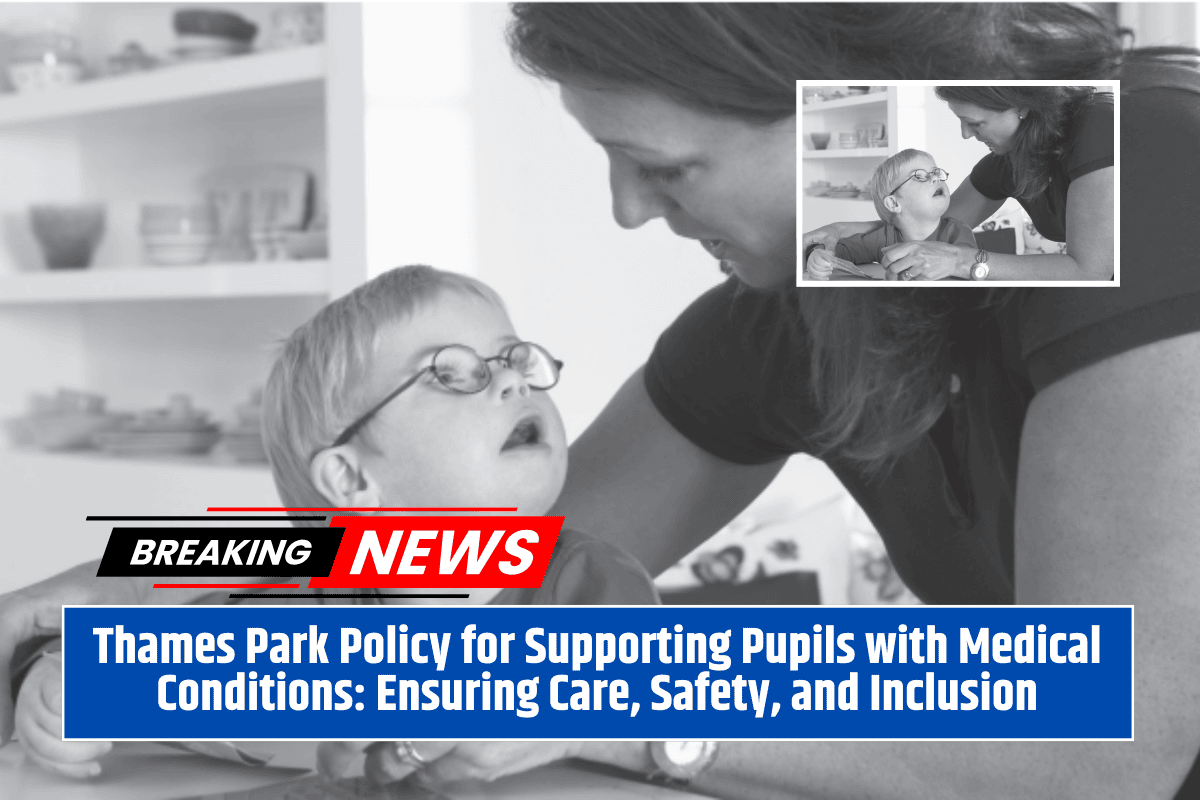At Thames Park Secondary School, students’ health and well-being are a priority. The school recognises that some children may need special medical support during school hours. This policy explains how the school ensures that pupils with both short-term and long-term medical conditions are well cared for, included in all activities, and supported to attend regularly without their medical needs becoming a barrier to learning.
Aim of the Policy
The main aim is to help all students attend school safely and regularly, regardless of their medical conditions. Whether it’s a long-term health issue or a short-term illness, the school ensures proper planning, safe medicine administration, and emergency preparedness.
Responsibilities
Parents/Carers are responsible for informing the school about their child’s condition, providing medicines in original packaging, giving consent, and updating the school about any changes.
The Governing Body ensures the policy meets legal standards, supports equal access for pupils with medical needs, and that necessary training and risk assessments are carried out.
The Headteacher ensures policies are followed, care plans are in place, trained staff are assigned, and that parents are informed about procedures.
Teachers and Staff should understand children’s health needs, know emergency procedures, and follow care plans. Support staff may assist in medicine administration if trained.
Students are encouraged to be involved in their care plans and, where appropriate, take responsibility for managing their medication.
Managing Medical Needs in School
Short-Term Conditions
Parents are advised to give medicines outside school hours when possible. If medication is needed during the day, only necessary medicines (maximum two types) should be sent, and the school should be informed of all details.
Long-Term Conditions
An Individual Health Care Plan (IHP) is created in consultation with parents, staff, and healthcare professionals. This plan outlines emergency procedures, dosage, and how support will be provided at school.
Medicine Storage and Access
All medication is stored securely, labelled clearly with the child’s name, dosage, and instructions. Some medications like inhalers may be kept with students if they are able to self-administer. Staff will supervise or assist if necessary.
Medication Policy Rules
- No pupil should carry any medicine unless permitted.
- Staff cannot give non-prescribed medicine unless clearly planned in an IHP.
- Pain relief medicines like paracetamol are not given by staff.
- Emergency medicines are accessible only to authorised staff and the student it is prescribed for.
- All administered medicine is recorded for safety and accountability.
Hygiene, Intimate Care, and Infection Control
For any invasive or personal medical procedures, two staff members will be present, ensuring the child’s dignity is respected. All staff use protective gear when dealing with body fluids.
Trips, Outings, and Activities
Children with medical needs are encouraged to join school trips and events. Plans are made in advance, including extra staff or risk assessments where needed. A copy of the care plan goes along during the trip.
Emergency Procedures
In emergencies, an ambulance is called immediately—staff will not transport pupils in personal vehicles. Emergency instructions are part of every child’s care plan and should be followed strictly.
Staff Training and Confidentiality
Staff training is arranged as needed, depending on a student’s condition. Medical information is confidential and shared only with relevant staff and with parental consent.
Record Keeping and Forms
All health details, care plans, and records of medicine administered are maintained properly. Key forms used include:
- Form 1: Individual Care Plan
- Form 2: Parent’s request for medication
- Form 3: Headteacher’s confirmation to administer medicine
- Form 4: Request for child’s self-management of medication
Thames Park’s policy ensures that no child is left behind due to a medical condition. With careful planning, trained staff, and strong communication with families, the school creates a safe and inclusive environment where every student can thrive. The school’s approach balances health care needs with academic participation, keeping the child’s best interest at the heart of everything.







